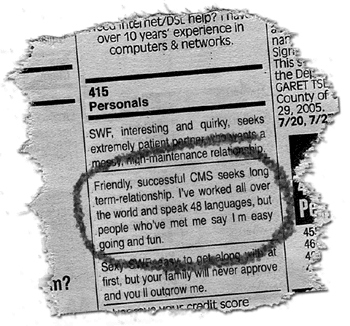 I'm really excited having just managed to download and install Plone 2.1 rc1 (release candidate 1) and all this after a long day yesterday with Richard Millwood and Matthew Eaves, working together on the new Ultralab website...
I'm really excited having just managed to download and install Plone 2.1 rc1 (release candidate 1) and all this after a long day yesterday with Richard Millwood and Matthew Eaves, working together on the new Ultralab website...
Plone is a content management system (CMS) or framework (CMF) as it is termed by the people at Plone. Essentially, Plone allows you to build complex websites where the data or content is stored within a database. This helps to organise your data or represent it in whichever way you please. Plone is particularly strong on building a sense of community, with a sound notion of Users and Groups and Privileges system, and is one of the defining factors why we are building the next Ultralab website and Ultraversity Portfolio/Community spaces using this tool.
Over the past 2 months, there has been an enormous learning curve to master - and we aren't there yet, but with each challenge, we seem to learn something new. Some things are still a mystery... like getting the FeedParser (RSS) to function from within ContentPanels (a Plone product) One of the most significant struggles is learning a new programming language, Python. Luckily, it is said that Python was a language developed to help people learn about programming. Shouldn't too hard then if you don't mind all the dots. Python.is.a.dot.programming.language !
So far we have been developing on Plone 2.0.5 and with Plone 2.1 (set for release on August 1st, now August 15th) - just around the corner, our recent concern has been, 'Will our development effort be wasted or lost during the upgrade process?' Currently, the latest version doesn't have a 'package installer' application and relies on downloading the binaries for install using commands such as
./configure; make; make install
Also, I've learnt about Subversion (a software application to manage version control) Thanks to Chris Davis, I've managed to make sense of the download and installation of Subversion. Thanks Chris. The web is just so handy for finding and learning new things.
This has led to me installing Zope 2.8.0, upgrading my version of Python to 2.3.5, installing Darwin Ports (whatever these are!) and using Subversion to download and install Plone 2.1 rc1
Now all I need to do is find out what happens to our development work when we import the site into the new version of Plone.
see also: